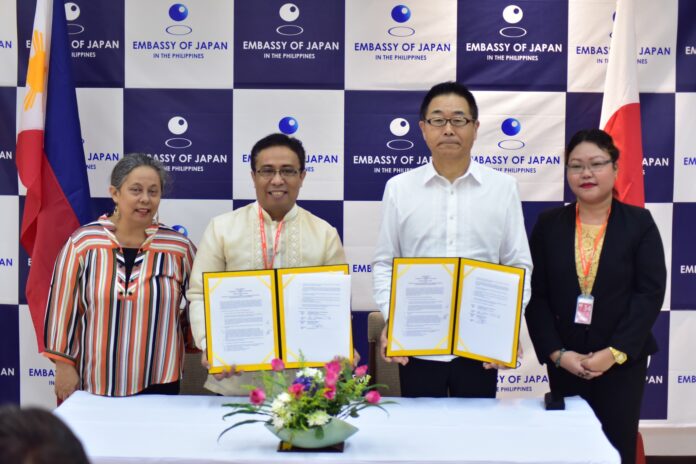Japan Ambassador to the Philippines Koshikawa Kazuhiko signed three grant contracts under Grant Assistance for Grass-Roots Human Security Projects (GGP) at the Japan Information and Culture Center Hall, Embassy of Japan in Pasay City. The total grant amount of USD 237,390 (approximately P13.27 million) will fund the construction of a one-story four-classroom high school building, provision of an ambulance, and provision of a portable chest X-ray machine.
In leading the ceremony, Ambassador Koshikawa bared Japan’s commitment as the country’s strategic and devoted partner in achieving sustainable and inclusive growth. He emphasized the uniqueness of the GGP, highlighting its ability to make substantial strides to directly empower local communities through projects tailor-fitted to evolving needs of the people.
The construction of a classroom building benefits the Anoyon High School in Valencia, Bohol as recipient of a USD94,607 grant or P5.279 million in local currency.
The Municipality of Sipocot, Camarines Sur is the recipient of another grant for USD55.027 or P3.054 million in local currency.
The existing ambulances in Sipocot face challenges in providing timely care during patient transport. are always on call, transporting patients to medical facilities including the municipal hospital 44 km away or the state hospital 120 km away. Furthermore, the vehicles are not equipped with appropriate medical devices and are often unable to provide needed care to patients during transport. Through the GGP, the LGU will procure a new ambulance, equipped with necessary medical devices, will respond to approximately 200 additional requests for dispatch annually, contributing to stronger and more efficient emergency and disaster operations.
The grant for the provision of a portable chest X-Ray machine for Olongapo City is worth USD87,756 equal to P9.94 million in local currency.
In Olongapo City, the number of tuberculosis (TB) screening has decreased since the Covid-19 pandemic, hindering the city’s TB prevention and treatment measures especially among the high TB risk group including Aeta people, the indigenous community in the mountains. Due to traditional lifestyle and economic disparity, Aeta people have limited access to medical services in the city.
With the portable X-ray machine (provided by FUJIFILM Philippines Inc.) procured through the GGP project, CHSI, Inc., the Manila-based NGO, and Olongapo City will be able to conduct active TB case finding and provide comprehensive healthcare services to the Aeta people and the urban poor.
Japan is the country’s top source of official development assistance or ODA funds.
The GGP scheme was launched in1989 to reduce poverty and help various communities engage in grassroots activities. The three projects signed Wednesday are the newest addition to the 560 grassroots projects that have already been implemented by the GGP.
Japan believes the projects will strengthen the friendship between Japan and the Philippines and contribute to sustaining strategic partnerships between the two countries.







